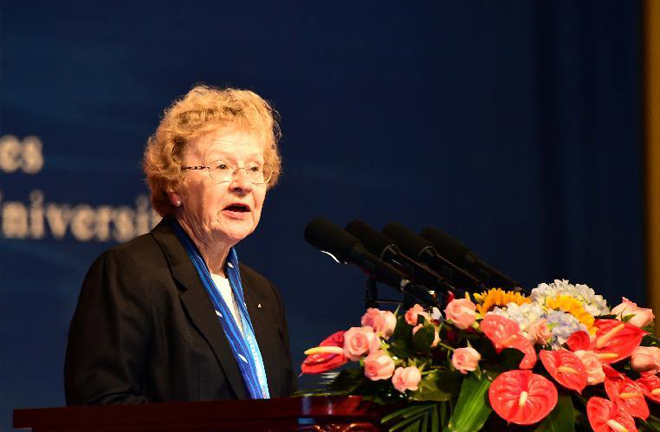Intl historical congress highlights China’s contributions to field

Marjatta Hietala, president of the International Committee of Historical Sciences, delivers a speech at the opening ceremony of the 22nd International Congress of Historical Sciences on Aug. 23 in China’s Shandong Province.
The International Congress of Historical Sciences, the most influential academic forum in the field of historical sciences, took place in Asia for the first time since its establishment in 1900. More than 2,600 experts and scholars from 90 nations and regions gathered at the 22nd congress, held from Aug. 23 to 29 in China’s Shandong Province.
History as research perspective
In his congratulatory letter, Chinese President Xi Jinping said China has a long history of more than 5,000 years, and reviewing its past is an important means of understanding the present. Knowledge of Chinese history and culture, particularly in modern times, is essential when contemplating contemporary Chinese society and the development path chosen by the Chinese people, Xi wrote.
Chinese Vice-Premier Liu Yandong said in her address to the opening ceremony that China has a history of striving for self-improvement and innovation, pursuing harmony and peace, and interacting with the outside world to achieve mutual learning.
Xi's and Liu’s views were echoed by attendees to the meeting. “Greater knowledge of history can build up confidence in the path, theory and system of socialism with Chinese characteristics,” said Zhang Haipeng, president of the Association of Chinese Historians.
Tao Wenzhao, a Chinese commissioner of the Executive Committee for the International Committee of Historical Sciences, said everything in the present is rooted in history, citing the example that China’s commitment to peaceful development carries on the legacy of traditional Chinese wisdom, such as “peace is to be cherished” and “seeking harmony without uniformity.”
A highlight of the congress was the theme “China from Global Perspectives.” Scholars considered China’s interactions with the world from various perspectives, including Europe and China in the Enlightenment, foreign exchanges during the Ming Dynasty (1368-1644), and the country’s role in the League of Nations at the beginning of 20th century.
Moreover, Marjatta Hietala, president of the International Committee of Historical Sciences, mentioned China’s Silk Road in her speech, saying the Silk Road, a symbol of communication and cooperation between East and West, is a historical and cultural legacy to all countries around the world.
Responsibility of times
Some scholars pointed out future historical studies in China should serve the purpose of solving real problems. Chinese historians should interpret China’s path from a historical perspective in line with Marxism, Zhang Haipeng said.
“At all times and in all countries, history has been a source of wisdom to guide human progress and is important to any country and nation,” said Zhang Sheng, a professor of history from Nanjing University. In China, however, research in this field is insufficient relative to its importance, and research on border areas and international relations needs to be strengthened, he said. “Historical issues concern national interests, and historians should explore factors closely related to national development.”
Global vision
“We gather here because we are aware that we must abandon the West-centric attitude in historical research,” said Laurent Tissot, a professor of contemporary history at the University of Neuchatel in Switzerland. “It is important to respect diversity, for we live in the same world. The communication and collision of ideas of historians from different parts of the world can help mankind understand the past, hold the present and create the future.”
“The congress comes as an opportunity to show China’s historical studies to the world,” Tao said.
In addition to its fine traditions, Chinese history has also made remarkable achievements in terms of modern academics, said Peng Gang, a professor of history at Tsinghua University. For instance, he said, Marxist historical theories, theories on social nature and development stage, and theories developed through the practical implementation of China’s path are on par with those in the West.
With regard to his expectations for Chinese history, Zhang Sheng suggested Chinese historians should show the contribution of Chinese history to the world in terms of conception and methodology while further promoting innovation in this field in line with historical materialism.
“A decade later, China may produce the most influential historians in the world,” Tissot said. And now, Chinese historians should expand the scope of research worldwide, he said.
Mao Li and Zhang Qingli are reporters at the Chinese Social Sciences Today.
